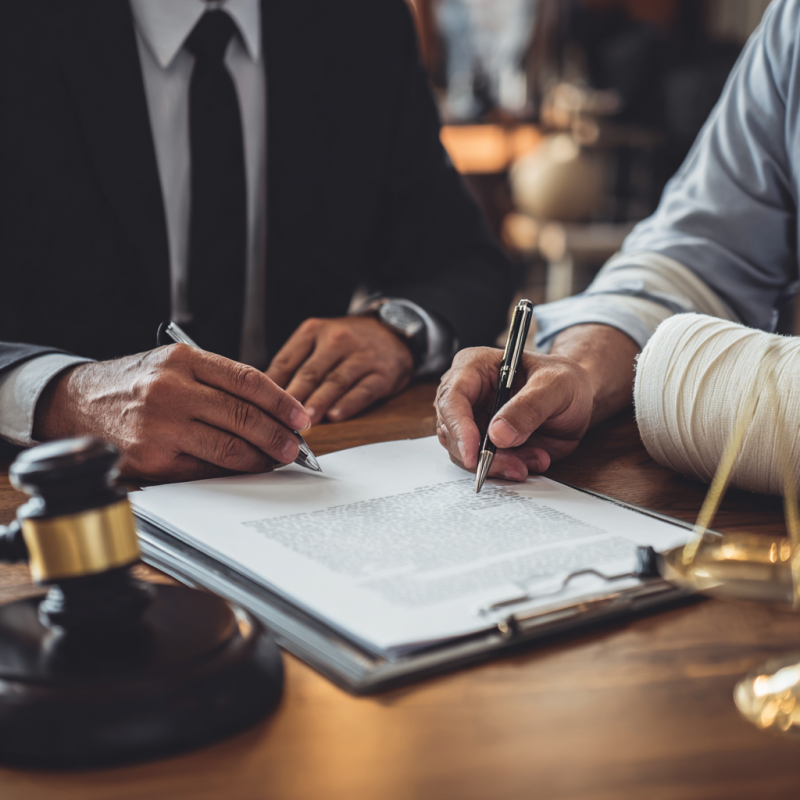How to Choose a Personal Injury Law Attorney

Learn How to Choose a Personal Injury Law Attorney With Confidence
If you’re asking how to choose a personal injury law attorney, you’re taking a vital step. You’ll protect your rights and seek fair compensation. After an accident, you may face medical bills, lost wages and complicated insurance forms. Most personal injury cases (over 90%) settle before trial, so your attorney’s negotiation skills matter. Good news, this process is more accessible than you might think. We’ll walk through steps to help you choose your legal partner with confidence.
Assess your case needs
Before you start searching, clarify what your case involves and what outcome you want. Consider:
- Type of injury (car crash, slip and fall, medical malpractice)
- Severity of damages (medical costs, lost income, pain and suffering)
- Complexity (multiple parties, disputed liability, ongoing medical care)
If you have a straightforward fender-bender claim, a less experienced lawyer may suffice. For complex medical negligence or catastrophic injuries, look for someone who handles large settlements and trial work. Don’t worry, even if your case feels unusual, attorneys often specialize in niche areas. Identifying your needs early will guide you toward the right credentials and experience.
Research credentials and experience
When you know your case type, you can zero in on attorneys who focus on personal injury law.
Start by checking:
- State bar membership (ensure they’re licensed)
- Years practicing in injury law (look for at least 3–5 years)
- Board certifications or specialty awards
To find qualified local counsel, try a personal injury attorney near me search then narrow the list to those with trial experience. Experience matters because most claims settle, but having someone ready to litigate can improve your negotiation leverage. If you see “AV Preeminent” or “Super Lawyer” designations, that’s a confidence booster, but always dig into case outcomes (next section).
Evaluate communication and accessibility
You’ll work closely with your attorney over weeks or months, so clear communication is key.
During your initial outreach, note:
- Responsiveness (do they return calls or emails within 24–48 hours?)
- Clarity (do they explain legal jargon in plain language?)
- Point of contact (will you deal directly with the attorney or a junior associate?)
Good news, most firms offer a free case review use it to test their style. You want someone who listens and updates you regularly. If you struggle to reach them in the consultation phase, imagine how that might feel when deadlines loom. Choose a lawyer whose communication ease puts you at ease too.
Review fee structure and costs
Most personal injury attorneys work on contingency, which means they collect a percentage of your recovery only if you win.
Key points to compare:
- Contingency percentage (often 33%–40%)
- Who covers case expenses (filing fees, expert witness costs)
- Whether you owe anything if you don’t recover
Ask for a clear fee agreement before you commit. If you have questions about typical rates, see our guide on how much does a personal injury law attorney charge. A transparent fee structure protects you from surprises and aligns your attorney’s incentives with your success.
Check past case results and references
A solid track record shows you what the attorney can deliver. When you review firm websites or hear recommendations, look for:
- Settlement amounts (range of case values)
- Verdicts (jury awards vs. settlements)
- Client testimonials (especially about personal service)
You can also request references from past clients who’ll speak to the lawyer’s style and outcomes. If a firm can share anonymized results (for example, “$150,000 settlement for a slip-and-fall”), that signals confidence. Don’t just take marketing at face value. A quick chat with a past client can reveal whether the attorney really fought for full compensation.
Schedule and prepare for consultations
Meeting two or three attorneys lets you compare and decide with clarity. To make the most of each consultation:
- Bring relevant documents (medical records, police reports, correspondence)
- Prepare key questions, such as:
- What experience do you have with cases like mine?
- How long will my case likely take?
- What challenges do you foresee?
- What questions to ask a personal injury law attorney should I consider before hiring?
- Note their communication style and estimated timeline
(You don’t need to decide on the spot.) Treat each meeting like an interview: you’re the employer and you want the best fit. By the end, you’ll feel confident about the attorney’s guidance and approach.
Learn How to Choose a Personal Injury Law Attorney
Choosing the right personal injury law attorney comes down to matching your case needs with proven expertise, clear communication and fair fees. First, define your case type and desired outcome. Next, research credentials, check experience, and see past results. Evaluate how each attorney communicates and how they bill for services. Finally, use consultations to make a personal connection and get a sense of their commitment. When you follow these steps, you’ll find a legal partner who helps you secure the compensation you deserve.
Take Control of Your Case Today and Get the Right Attorney Now
If you’ve been injured and need legal help, don’t delay. Schedule a free consultation today and let a qualified personal injury law attorney review your case. Protect your rights, maximize your compensation, and move forward with peace of mind.
Frequently Asked Questions
1. What does a personal injury law attorney do?
A personal injury law attorney represents clients injured by accidents or negligence. They gather evidence, negotiate with insurers, and, if needed, fight in court to secure compensation for medical costs, lost wages, and pain.
2. How much does a personal injury law attorney charge?
Most attorneys charge on a contingency basis, meaning no fee unless you win. Rates typically range from 25%–40% of your settlement or award.
3. When do I need a personal injury law attorney?
Hire a personal injury lawyer if you face serious injuries, high medical bills, or insurance disputes. They’re vital when fault is unclear or recovery is long-term.
4. What questions to ask a personal injury law attorney?
Ask a lawyer about experience, success rates, fees, and communication style. Also, find out how they balance negotiation and litigation.
5. What questions should I ask a personal injury law attorney?
Focus on their experience, strategy and communication plan. Key questions include case timelines, potential challenges and your role in the process. See our full list at what questions to ask a personal injury law attorney.
6. Can I change attorneys during my case?
Yes, you can switch lawyers if you’re unhappy with service or strategy. Check your fee agreement for any notice requirements or transfer fees.
7. What makes the best personal injury attorney?
The best attorneys combine deep legal knowledge, strong negotiation skills, transparent fees and clear communication. They treat you as a partner and advocate fiercely for your rights.
Key takeaway
- Define your case type and goals before you start looking.
- Verify credentials, specialization and trial experience.
- Choose an attorney who explains legal terms in plain language.
- Compare contingency fees and expense policies.
- Review past settlements, verdicts and client feedback.
- Prepare documents and questions for your initial meetings.
